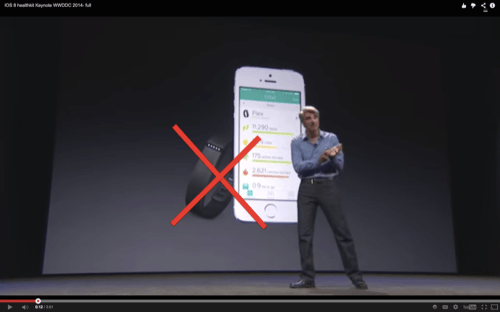
ReadWriteBody is an ongoing series where ReadWrite covers networked fitness and the quantified self.
In June, Apple executive Craig Federighi unveiled HealthKit, a set of software tools for sweeping together data from a variety of fitness apps and devices. One of his examples: Fitbit, the biggest seller in the activity-band category.
Four months later, Federighi’s gesture remains unreturned. Fitbit, unlike Jawbone, MyFitnessPal, Strava, and a host of other players in digital fitness, hasn’t embraced HealthKit.
Officially, Fitbit is still taking a wait-and-see attitude. As 9to5Mac reported Wednesday, a Fitbit employee posted in a thread on the company’s customer forums that Fitbit did “not currently have plans to integrate with HealthKit.”
That thread has attracted 41 pages of comments and counting, with 619 votes in favor of Fitbit integrating with HealthKit. Many customers denounced Fitbit for its stance. Moderators asked them for suggestions on what they’d like to see in a Fitbit-HealthKit integration—and that didn’t go over well.
BlazeEBlake wrote:
What more needs to be understood or evaluated? Customers are using multiple apps for health and fitness data because no one app does everything/everything perfectly. They want to collect it all in one place. They want you devices and data to be a part of that collected information. Why is that so difficult?
And thoxig wrote:
Fitbit avoiding healthkit integration seems extremely likely to push me into an entirely different ecosystem – iwatch, withings, etc. Why would I keep using a proprietary system that doesn’t share data? I’ll just get a differnt sensor that plays well with others.
heylookatlane wrote:
This is all so confusing. If FitBit intends to work on this, even if it will take them a while to figure it out, why not just say so? The current approach is so insulting. “We are continuing to evaluate it” is written in the same block of text as “We have no intention of integrating with HealthKit.” Which of these statements is true? Does this company have a plan?
As the uproar continued this week, Fitbit provided a statement to Gizmodo from CEO James Park that appeared to soften the company’s stance :
At Fitbit, our mission is to help people lead healthier, more active lives, so we’re always looking for ways that our users can use their data to support their fitness goals. For the past few years, we’ve been the leader in developing direct partnerships through our open API with hundreds of the most popular health apps, wellness programs, incentive systems, and other services that have enabled our users to make the most of their Fitbit products and data. Because of this commitment to connect with other applications, HealthKit is really interesting to us. Since its announcement, we’ve been evaluating integration with HealthKit as more of its features and benefits are revealed.
Fitbit remains committed to supporting all of our users, whether they sync their Fitbit products with iOS, Android or Windows Phone devices, Macs or PCs. While HealthKit works only on the iOS platform, we also plan to maintain direct integrations with our partners so that Android, Windows Phone and PC and Mac users in addition to our iOS users can benefit from our partnerships.
I’m actually sympathetic to Park’s position here. Many early adopters of HealthKit were burned by Apple’s sloppy release of the software, which led to weeks of delays in getting HealthKit-ready apps out. And when we actually got our hands on the Health app, which displays the data that other apps share via HealthKit, the reality was far from the slick promises Federighi made this summer at Apple’s Worldwide Developers Conference.
Don’t forget, too, that Apple has promised to release a smartwatch with built-in fitness features next year. At $349 and up, the Apple Watch will be far more expensive than Fitbit’s trackers, but it will also be more capable, offering heart-rate data and notification features. At some level, all wearable devices will compete for consumers’ attention and space on their bodies.
See also: Here Come Apple And Google In The Battle For Your Health
And Park is spot-on in critiquing HealthKit as an iOS-only solution. Fitbit’s first trackers synced with desktop PCs, not mobile devices; it didn’t introduce a mobile app until 2011. HealthKit will likely never address the needs of Android users. And its model of segregating your data on your phone, rather than a secure cloud store that you can access with any kind of device, is fundamentally flawed.
Would those same customers who are berating Fitbit for missing out on HealthKit be yelling at the company for tying itself to a buggy, limited platform? Quite possibly yes.
Screenshot by Stephanie Chan for ReadWrite, annotated by Owen Thomas









